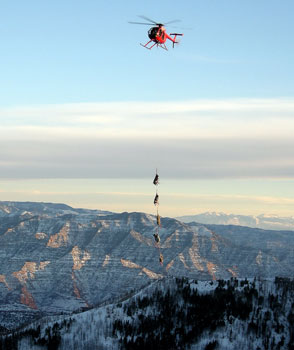 Bighorn sheep caught a break Wednesday when Representative Mike Simpson of Idaho, chairman of the Appropriations Subcommittee on Interior and the Environment, withdrew his rider to the 2013 Interior Appropriations Bill.
Bighorn sheep caught a break Wednesday when Representative Mike Simpson of Idaho, chairman of the Appropriations Subcommittee on Interior and the Environment, withdrew his rider to the 2013 Interior Appropriations Bill.
This amendment would have blocked the Payette National Forest from implementing the third and final phase of its management plan to separate bighorn sheep from domestic sheep on 6,800 acres of public land through grazing reductions.
“Today, I’m calling for a ‘time out’ from the fighting and allegations — many of which are false”, Simpson said. “I got involved in this issue because I care deeply for our ranchers and for the tribes and sportsmen who work so hard on bighorn sheep conservation. I got involved to find a reasonable solution and tried to work with ranchers, hunters, and land management agencies to solve this problem.”
The Payette National Forest management plan was finalized in 2010 and the first phase, which banned domestic sheep from 54,000 acres, took effect this past year. The second wave of closures will have another 7,700 acres closed to grazing this year. In 2013, the final 6,800 acres will go off-line, totaling approximately 68,500 acres of closures.
Simpson proposed the new rider, which specifically mentioned the Payette National Forest and would have not allowed federal agencies to spend money to institute grazing reductions that would be implemented after July 1, 2011. However, he decided for a withdrawal of the amendment so that all interested parties can come to the table to discuss potential solutions.
According to Gray Thornton, president of the Wild Sheep Foundation, the issue is a contentious one, pitting private domestic sheep ranchers against hunters and bighorn conservations. He applauded Simpson’s decision to remove the rider.
“The rider (was) a disincentive to bring the domestic sheep and hunting fraternity together to collaborate locally on long-term solutions to the disease issue caused by comingling of domestic sheep with wild sheep,” Thornton said. “Local and state stakeholders are the best suited to find win-win solutions and have done so in states such as Nevada, Utah and Wyoming, where collaboration has fostered both thriving bighorn populations and domestic sheep industries. The rider (was) a top-down, unwarranted federal approach to a problem best addressed at the local level.”
Other conservation groups also hailed the decision.
“We appreciate Chairman Simpson taking a step back in order to foster further consideration” said Congressional Sportsmen’s Foundation President Jeff Crane. “We believe the Congressman’s approach is right on target.”

